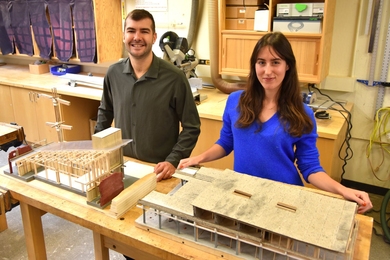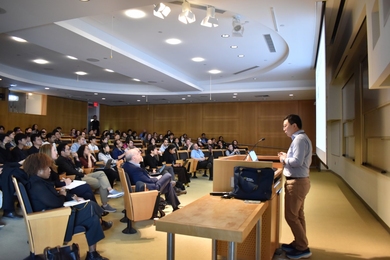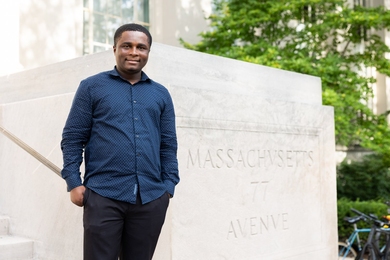The Mineral, Metals and Materials Society (TMS) presented Markus Buehler, associate professor in the Department of Civil and Environmental Engineering, with the 2013 Robert Lansing Hardy Award last month at its annual meeting in San Antonio, Texas.
TMS is the oldest and second largest materials research society in the country. The Hardy award is one of its most prestigious, presented to researchers under the age of 35 whose work has had a broad impact in the field of materials science and engineering. TMS honored Buehler with the Hardy prize for his “innovative work in computational materials science of biological, bio-inspired and synthetic materials, focused on mechanical properties and, in particular, deformation and failure.”
“I feel humbled and very honored to be selected for this extremely prestigious award,” said Buehler, who has been promoted to full professor effective July 1. “I first would like to thank and express my deep gratitude to all the students and postdocs in my lab at MIT, whose dedication to materials science and hard work made this achievement possible. Also, I extend appreciation to all my mentors and colleagues in civil and environmental engineering, collaborators within the Institute and beyond, who have contributed to my work at all levels.”
Buehler’s research group looks at the materials science and mechanics of natural and biological protein materials such as spider silk and collagen, and how they relate to macroscopic structures like spider webs and bone. The group employs large-scale atomistic modeling to study the interaction of the materials’ chemistry, molecular structure and mechanics. Buehler applies the insights derived from these studies in the design, synthesis and testing of new materials that are lighter, stronger and more durable, but that that can be produced from simple and abundant raw materials. The group also develops multi-scale simulation tools to further advance this type of work.
Two recent examples of Buehler’s research include a study on how spider webs respond to common environmental forces (wind, rain and the weight of insects), and a study of the hierarchical structure of spider silk and how it resembles the structure of a musical score.
Buehler has an impressive record of awards and honors. Within the past three years alone he has been presented with the IEEE Holm Conference Mort Antler Lecture Award (2012); the Society of Engineering Science Young Investigator Medal (2012); the Materials Research Society Outstanding Young Investigator Award (2012); the Alfred Noble Prize given by the combined engineering societies of the United States (2012); the Thomas J.R. Hughes Young Investigator Award (2011); the Leonardo da Vinci Award from the American Society of Civil Engineers Engineering Mechanics Institute (2011); the Stephen Brunauer Award from the American Ceramic Society (2011); the Rossiter W. Raymond Memorial Award from the American Institute of Mining, Metallurgical and Petroleum Engineers (2011); the Sia Nemat-Nasser Award from the American Society of Mechanical Engineers (2010); and the MIT Harold E. Edgerton Faculty Achievement Award (2010).
Earlier awards include the Presidential Early Career Award for Scientists and Engineers (PECASE) in 2009, the United States Navy Young Investigator Award in 2008, and the National Science Foundation CAREER Award in 2007. Buehler serves as an editor or participates on the editorial board of seven research journals and has chaired several research conferences.
TMS is the oldest and second largest materials research society in the country. The Hardy award is one of its most prestigious, presented to researchers under the age of 35 whose work has had a broad impact in the field of materials science and engineering. TMS honored Buehler with the Hardy prize for his “innovative work in computational materials science of biological, bio-inspired and synthetic materials, focused on mechanical properties and, in particular, deformation and failure.”
“I feel humbled and very honored to be selected for this extremely prestigious award,” said Buehler, who has been promoted to full professor effective July 1. “I first would like to thank and express my deep gratitude to all the students and postdocs in my lab at MIT, whose dedication to materials science and hard work made this achievement possible. Also, I extend appreciation to all my mentors and colleagues in civil and environmental engineering, collaborators within the Institute and beyond, who have contributed to my work at all levels.”
Buehler’s research group looks at the materials science and mechanics of natural and biological protein materials such as spider silk and collagen, and how they relate to macroscopic structures like spider webs and bone. The group employs large-scale atomistic modeling to study the interaction of the materials’ chemistry, molecular structure and mechanics. Buehler applies the insights derived from these studies in the design, synthesis and testing of new materials that are lighter, stronger and more durable, but that that can be produced from simple and abundant raw materials. The group also develops multi-scale simulation tools to further advance this type of work.
Two recent examples of Buehler’s research include a study on how spider webs respond to common environmental forces (wind, rain and the weight of insects), and a study of the hierarchical structure of spider silk and how it resembles the structure of a musical score.
Buehler has an impressive record of awards and honors. Within the past three years alone he has been presented with the IEEE Holm Conference Mort Antler Lecture Award (2012); the Society of Engineering Science Young Investigator Medal (2012); the Materials Research Society Outstanding Young Investigator Award (2012); the Alfred Noble Prize given by the combined engineering societies of the United States (2012); the Thomas J.R. Hughes Young Investigator Award (2011); the Leonardo da Vinci Award from the American Society of Civil Engineers Engineering Mechanics Institute (2011); the Stephen Brunauer Award from the American Ceramic Society (2011); the Rossiter W. Raymond Memorial Award from the American Institute of Mining, Metallurgical and Petroleum Engineers (2011); the Sia Nemat-Nasser Award from the American Society of Mechanical Engineers (2010); and the MIT Harold E. Edgerton Faculty Achievement Award (2010).
Earlier awards include the Presidential Early Career Award for Scientists and Engineers (PECASE) in 2009, the United States Navy Young Investigator Award in 2008, and the National Science Foundation CAREER Award in 2007. Buehler serves as an editor or participates on the editorial board of seven research journals and has chaired several research conferences.






